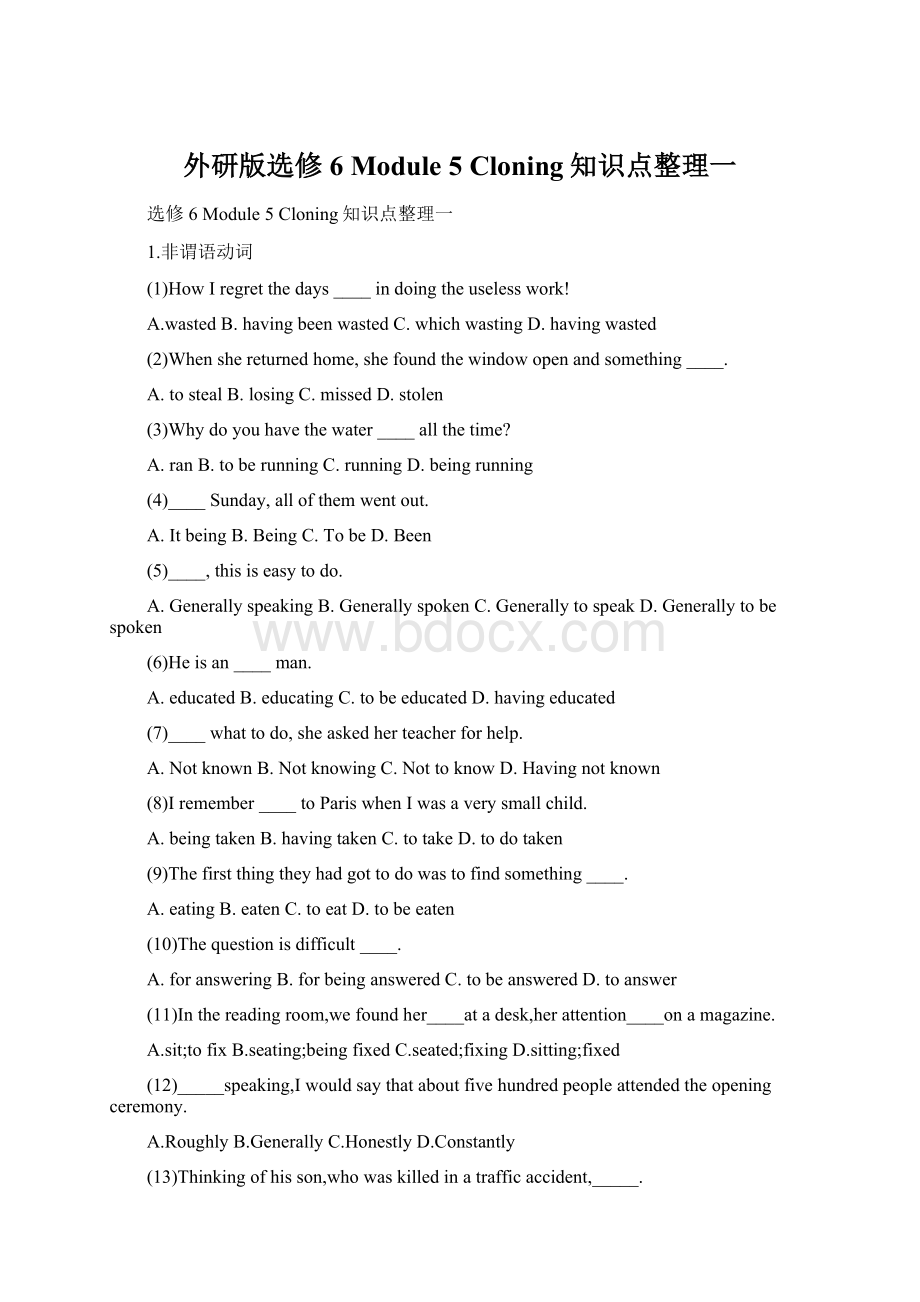外研版选修6 Module 5 Cloning知识点整理一Word下载.docx
《外研版选修6 Module 5 Cloning知识点整理一Word下载.docx》由会员分享,可在线阅读,更多相关《外研版选修6 Module 5 Cloning知识点整理一Word下载.docx(13页珍藏版)》请在冰豆网上搜索。

(9)Thefirstthingtheyhadgottodowastofindsomething____.
A.eatingB.eatenC.toeatD.tobeeaten
(10)Thequestionisdifficult____.
A.foransweringB.forbeingansweredC.tobeansweredD.toanswer
(11)Inthereadingroom,wefoundher____atadesk,herattention____onamagazine.
A.sit;
tofixB.seating;
beingfixedC.seated;
fixingD.sitting;
fixed
(12)_____speaking,Iwouldsaythataboutfivehundredpeopleattendedtheopeningceremony.
A.RoughlyB.GenerallyC.HonestlyD.Constantly
(13)Thinkingofhisson,whowaskilledinatrafficaccident,_____.
A.hisheartsankB.hewasindeepsorrowC.tearscameintohiseyesD.wefoundhimintears
(14)Itsoundslikesomethingiswrongwiththecar’sengine.______we’dbettertakeittothegarageimmediately.
A.OtherwiseB.ifnotC.ButforthatD.Ifso
(1)A
(2)D(3)C(4)A(5)A(6)A(7)B(8)A(9)C(10)D(11)D(12)A粗略地说(13)B
(14)D听起来好像汽车的发动机出了故障。
如果这样的话,我们最好马上把它开到维修厂(修理一下)
2.从句练习
(1)We’llneverforgetthedays______wespentontheseashore.
A.duringwhichB.inwhichC.whenD./
(2)Isthisthereason_____youareinfavouroftheproposal?
A.whichB.thatC.whyD.forthat
(3)The11thAsianGames,______Chinawon183goldmedals,washeldintheautumnof1990.
A.whichB.thatC.atwhichD.atthat
(4)Theonlything______iswrongwiththisis______afriendofminesaidtometheotherday.
A.which;
whatB.what;
thatC.that;
whatD.that;
which
(5)Whoistheman______istalkingwithJohn?
A.whichB.whoC.whatD.that
(6)Thefarmeruseswoodtobuildahouse______tostoregrains.
A.withwhichB.towhereC.whichD.inwhich
(7)Ireallydon’tknow______Ihadmypocketpicked.
A.wherewasitthatB.itwaswherethatC.whereitwasthatD.wasitwherethat
(8)Heinsistedthathe______rightindoingthat.
A.shouldbeB.wasC.wouldbeD.is
(9)—HaveyouheardfromMaryrecently?
—Yes,shesaidshewasthinking______sheshoulddonext.
A.thatB.ofwhatC.whatD.how
(10)Canyouguess______?
A.whothatmanisB.whoisthatmanC.whatisthatmanD.whomthatmanis
(11)Heexpressedahope______hewouldvisitChinaagainthenextyear,andthiswastheveryhope_____hewouldexpressassoonashearrivedinthecountry.
A.that;
thatB.which;
whichC.that;
whichD.which;
that
(1)A定语从句
(2)C(3)C(4)C第一空是定语从句,第二空是表语从句(5)D(6)Dwith表用某种工具或手段.westoregrainsinthehouse.house不用做工具.(7)C强调句(8)Binsist当“坚持说”讲时,引导的宾语从句用陈述语气;
当“坚持要求”讲时,引导的宾语从句用虚拟语气。
例如:
Heinsistedthathewasingoodhealthandbesenttoworkthere.他宣称自己身体很好,他坚决要求要把他送到那工作。
(9)B宾语从句(10)A宾语从句(11)A前一个空是同位语从句,后一个空是定语从句
3.时态练习
(1)Thehousebelongstomyauntbutshe____hereanymore.
A.hasn’tlivedB.didn’tliveC.hadn’tliveD.doesn’tlive
(2)Thismachine____.Ithasn’tworkedforyears.
A.didn’tworkB.wasn’tworkingC.doesn’tworkD.isn’tworking
(3)Lookatthetimetable.Hurryup!
Flight4026____offat18:
20.
A.takesB.tookC.willbetakenD.hastaken
(4)Ladiesandgentlemen,pleasefastenyourseatbelts.Theplane____.
A.takesoffB.istakingoffC.hastakenoffD.tookoff
(5)—Wheredidyouputthecarkeys?
—Oh,I____IputthemonthechairbecausethephonerangasI____in.
A.remembered;
comeB.remembered;
wascoming
C.remember;
comeD.remember;
(6)Thewater____coolwhenIjumpedintothepoolformorningexercises.
A.wasfeltB.isfeltC.feltD.feels
(7)Elizarememberseverythingexactlyasifit____yesterday.
A.washappeningB.happensC.hashappenedD.happened
(8)I____inLondonformanyyears,butI’veneverregrettedmyfinaldecisiontomovebacktoChina.
A.livedB.waslivingC.havelivedD.hadlived
(9)Whatweusedtothink____impossiblenowdoesseempossible.
A.isB.wasC.hasbeenD.willbe
(10)MycousinwenttoCanadatwoyearsago.He____thereforafewmonthsandthenwenttoAmerica.
A.workedB.wouldworkC.wouldbeworkingD.hasbeenworking
(11)I_____tocallonyouyesterday,butsomeonecametoseemejustwhenIwasabouttoleave.
A.hadintendedB.intendedC.haveintendedD.wasintending
(1)D
(2)C(3)A(4)B(5)Dremember指的是现在记得remembered是指过去记得.根据意思是现在(说话时)记得,所以用一般现在时.(6)C(7)D(8)A(9)Bwhatweusedtothinkwasimpossiblenowseemspossible.这句话是what引导的主语从句.whatweusedtothinkwasimpossible在句中做主语,seem为谓语.而was并非多余,因为weusedtothink相当于插入语(10)A(11)A过去本打算做而实际上没有做成
4.语法:
虚拟语气
虚拟条件句中主从句的谓语形式
不同虚拟条件下,虚拟条件句中主句和从句谓语的不同形式:
虚拟情况
从句谓语(以do为例)
主句谓语(以do为例)
对现在情况的假设
did(be通常用were)
would/should/could/might+do
对过去情况的假设
had+done
would/should/could/might+havedone
对将来情况的假设
①did(be通常用were)
②wereto+do
③should+do
IfIhadenoughmoneynow,Iwouldbuyacar.(现在)
Ifitweretorain/shouldrain/rained,thecropswouldbesaved.(将来)
Ifyoucametomorrow,wewouldhavethemeeting.(将来)
Ifitweretorain,weshouldgetwet.(将来)
Ifheshouldnotcometomorrow,weshouldputoffthemeetingtillnextMonday.(将来)
Ifwehadn’tmadeadequate充足的preparations,theconferencewouldn’thavebeensosuccessful.(过去)
★错综时间条件句:
当条件状语从句表示的行为和主句表示的行为所发生的时间不一致时,被称为“错综时间条件句”,动词的形式要根据它所表示的时间作出相应的调整。
Ifyouhadfollowedmyadvicejustnow,youwouldbebetternow.如果你刚才听从我的建议,你现在会好多了。
Ifithadrainedlastnight(过去),itwouldbeverycold.(现在)
IfIwereyou(现在),Iwouldhavetakenhisadvice(过去).
★虚拟条件句的倒装
如果在虚拟条件句中含有had,should或were时,可把它们放于句首,并省略if,使用倒装语序。
HaditnotbeenforthePLA,wewouldn’thavebeenabletobeattheflood.(正常语序为Ifithadn’tbeenforthePLA,wewouldn’thavebeenabletobeattheflood.)要不是人民解放军,我们是无法战胜洪水的。
Shoulditraintomorrow,wewouldnotgoclimbing.(正常语序为Ifitshouldraintomorrow,wewouldnotgoclimbing.)
WereIabird,Iwouldflytoyouatonce.(正常语序为IfIwereabird,Iwouldflytoyouatonce.)
名师指津:
若条件从句是否定形式,倒装结构not不能与were,should和had缩写在一起,只能将not放在后面。
我们可以说:
Wereitnotfortheexpense,Iwouldgoabroadnow.但是不能说:
Weren’titfortheexpense,Iwouldgoabroadnow.
★含蓄条件句
由介词短语引出的虚拟条件句,称为含蓄条件句。
含蓄条件句中常由without要是没有,butfor要不是,or,otherwise否则等引出,而句子谓语形式则与同等虚拟条件下虚拟条件句的主句的谓语形式相同。
Withoutair(Iftherewerenoair),therewouldbenolivingthings.如果没有空气的话,就不会有生物了。
Butfor(要不是)yourhelp(Ifithadn’tbeenforyourhelp)Icouldn’thavedoneit.要是没有你的帮助,我就不可能完成这件事。
Hetelephonedtoinformmeofyourbirthday,orIwouldhaveknownnothingaboutit.
你的生日是他打电话告诉我的,否则我对此一无所知。
★asif也可用来引导方式状语从句,引导的从句常用虚拟语气,表示从句说的情况并非真实,而是主观的想象或夸张的比喻;
如果从句所表示的情况是事实或说话人认为近乎是事实,亦可用陈述语气。
HetreatsmeasifIwereastranger.(现在:
“谓语动词用一般过去式”)
HetalkedabouttheGreatWallasifhehadbeentherebefore.(过去“had+过去分词”)
Heopenedhismouthasifhewouldsaysomething.他张开嘴好像要说什么。
(将来:
would/could/might+动词原形)
(1)Ifmycar______morereliable,IwouldhavedriventoLhasainsteadofflyinglastsummer.
A.wasB.hadbeenC.shouldbeD.wouldbe
(2)Withouttheairtoholdsomeofthesun’sbeat,theearthatnight_____forustolive.
A.wouldbefreezingcoldB.willbefreezingcoldly
C.wouldbefrozencoldD.canfreezecoldly
(3)MaybeifI______science,andnotliteraturethen,Iwouldbeabletogiveyoumorehelp.
A.studiedB.wouldstudyC.hadstudiedD.wasstudying
(4)Sorry,Iamtoobusynow.IfI______time,Iwouldcertainlygoforanoutingwithyou.
A.havehadB.hadhadC.haveD.had
(5)Bobwouldhavehelpedusyesterday,buthe___________(be)busy.
(6)Withoutanyfriend,we_____(feel)lonely.
(7)Welostourwayinthatsmallvillage,otherwisewe_____(visit)moreplacesofinterestyesterday.
(8)Withoutyourhelp,we________(fail)intheproject.
(9)Aseriousstudyofphysicsisimpossible________someknowledgeofmathematics.
(10)_____theaidfromthegovernment,theflood-strickenarea_____greaterloss.
A.Apartfrom;
shouldhavesufferedB.Butfor;
wouldhavesuffered
C.Without;
couldsufferD.Exceptfor;
(11)Peoplearerecyclingmanythingswhichthey__________(throw)awayinthepast.
(12)We________(be)backinthehotelnowifyoudidn’tlosethemap.
(13)________(be)therenomoderntelecommunications,wewouldhavetowaitforweekstogetnewsfromaroundtheworld.
(14)IfMrDewey_________(be)present,hewouldhaveofferedanypossibleassistancetothepeoplethere.
(15)______hecaughtthemorningtrain,hewouldnothavebeenlateforthemeeting.
(16)Theywereabroadduringthemonthswhenwewerecarryingouttheinvestigation,orthey_____________(come)toourhelp.
(17)I________(go)tomycousin’sbirthdaypartylastnight,butIwasnotavailable.
(18)—DoyouthinkGeorgehaspassedthedrivingtest?
—No,ifso,he_______(drive)hiscartoourcollegeyesterday.
(19)IfhehadspentmoretimepractisingspeakingEnglishbefore,he_______(be)abletospeakitmuchbetternow.
(20)Itmighthavesavedmesometrouble_____Iknowntheschedule.
(21)ItwasJohnwhobrokethewindow.WhyareyoutalkingtomeasifI_______(do)it?
(22)—Howmuchoftheforeignexpert’sspeechhaveyouunderstood?
—Almostnothing.IwishI_____harderatE